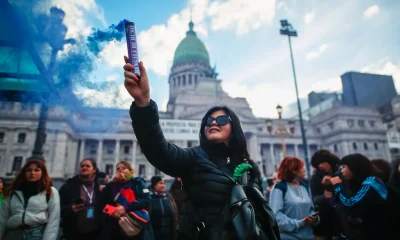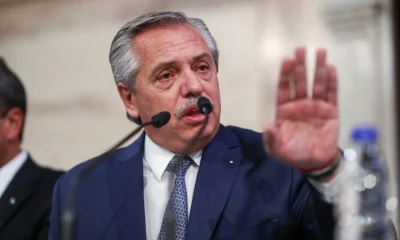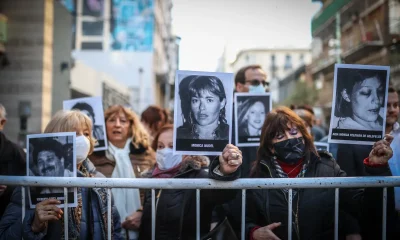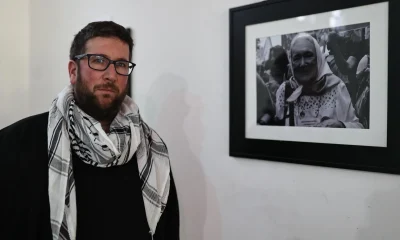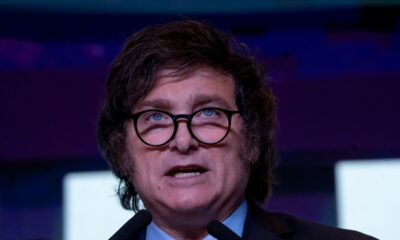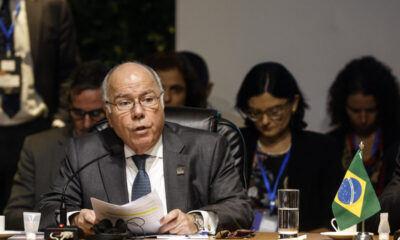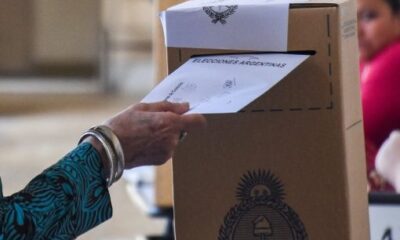International
Milei celebrates 100 days as president, between the controversy and his obstinacy about the course
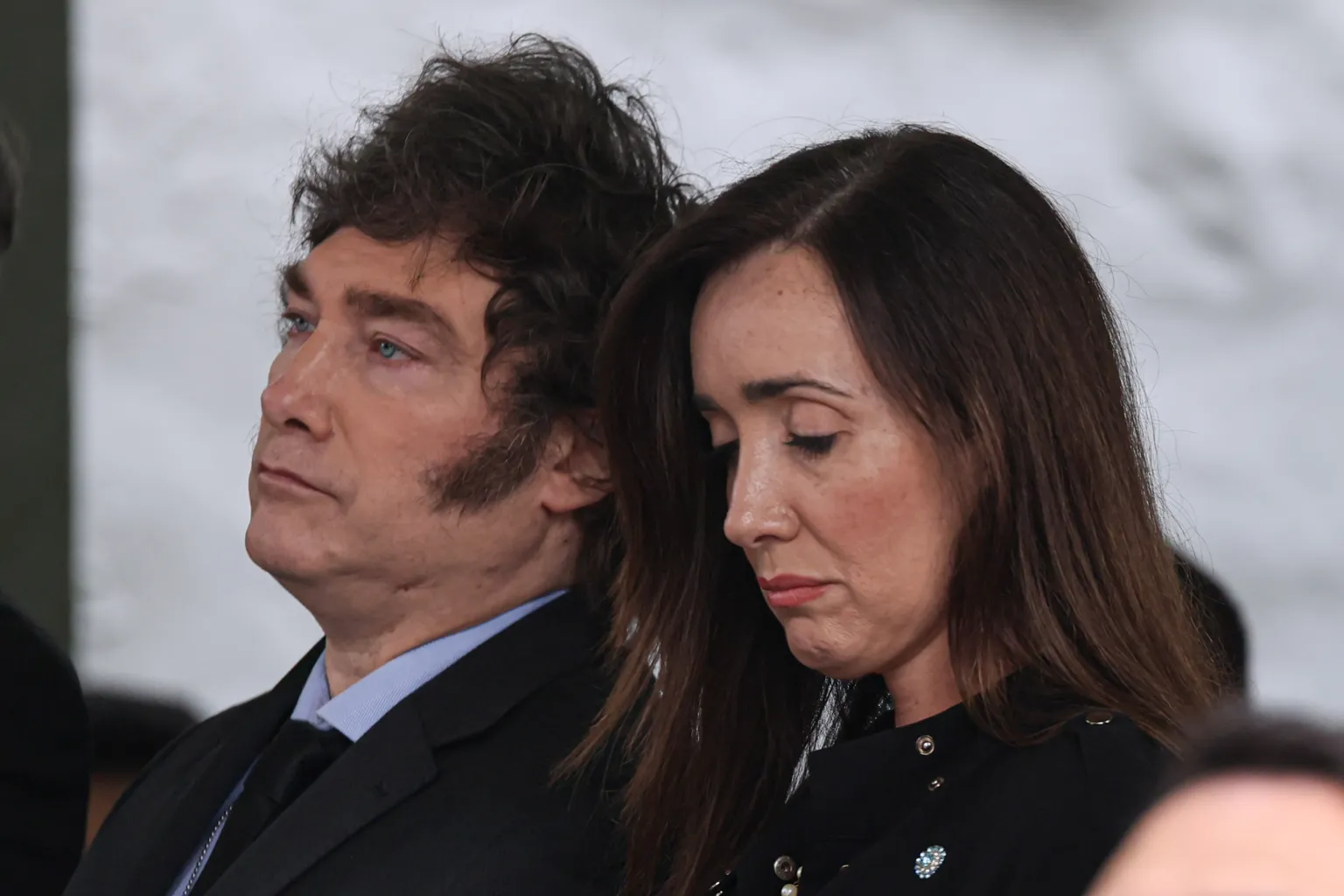
The president of Argentina, Javier Milei, celebrates 100 days of management this Tuesday, in which he has shown obstinacy in the course to achieve fiscal balance and reduce the weight of the State to lower inflation, despite the setbacks in Congress; the fall in purchasing power and criticism for his confrontational method.
In several publications that Milei replied on his social network account X, a direct media that he appreciates a lot, he celebrated that he “avoided the hyperinflation” that was “activated” by his predecessor, the Peronist Alberto Fernández (2019-2023); he began the “sustained process of disinflation” and the decrease in country risk, today at 1,520 basis points.
In terms of security, he replied messages that say that he “ended the pickets” and “he stood against insecurity and narco-terrorism,” and as for corruption, “the amount of illegalities” that he is discovering.
Milei took advantage of this Tuesday to exhibit the unit with her vice president, Victoria Villarruel, on social networks, where they came to publish a photo hugging, after she participated in the meeting of the Cabinet of ministers in the Casa Rosada: “Those who are fighting…!!!,” the president said ironically.
The relationship between Milei and Villarruel reached a peak of tension last week due to the decision of the vice president – who also chairs the Senate – to convene a session in the Upper House where the megadecree of necessity and urgency (DNU) signed by the president in December was rejected.
The presidential spokesman, Manuel Adorni, defined the first 100 days as “a case study” and “an atypical case,” in his usual press conference at the Executive headquarters.
Adorni listed that since Milei took office on December 10, Congress rejected the DNU and a fundamental bill for the Executive, the main union center called for a general strike on January 24 and there were train and bus stops.
In addition, the Patagonian province of Chubut threatened to cut off the supply of hydrocarbons and opposition groups “fantasized” that the far-right would fall for these months.
“This was the only Government (…) that in the first days of the Government has meticulously fulfilled each of the points it had promised in the campaign,” Adorni said, because it “attacked from the outset” the fiscal deficit and clung to the balance of public accounts to “end inflation and the destruction of the currency.”
Milei is an ‘outsider’ who, with aggressive speech and disruptive forms against the “political caste,” won the elections in a second round last November, with 56% support.
“No other government so far had been encouraged to put their hand in politics’s pocket” or “exposed as much to politics” as Milei’s, Adorni said.
Fernández is one of the opposition politicians who criticized the first 100 days of Milei, by showing on his social networks that inflation rose by 71.3%, industrial production fell by 19.4%, retail sales of SMEs fell by 23% and the real salary of registered private workers fell by 27.1%, among other negative indicators.
Amnesty International Argentina warned that the “confrontation” practiced by the Government of Milei is to divert attention from those real conflicts – inflation, poverty, lack of medicines – and violate freedom of expression, and asked for “basic rules of coexistence and non-aggression, especially from the presidential investiture and its collaborators.”
Despite the severe economic adjustment that causes a loss of purchasing power, with inflation that climbed to 276.2% year-on-year last February, Milei maintains a positive image of more than 50%, according to opinion polls.
In that sense, the Government of Milei also boasts of having “changed the concept of governance” because now “it is given by the support of the people,” in a context in which its far-right party, La Libertad Avanza, only has 38 deputies, 7 senators and no provincial governor.
Adorni acknowledged that “there is still a lot to do,” remembering that seven out of ten minors are still poor in Argentina, but that “this time a new sun comes to impoverished Argentina.”
International
U.S. Senate Rejects Budget, Bringing Government Closer to Shutdown Amid DHS Dispute

The U.S. Senate voted on Thursday against a budget proposal in a move aimed at pressuring changes at the Department of Homeland Security (DHS), following the killing of two civilians during a deployment of immigration agents in Minneapolis.
All Senate Democrats and seven Republican lawmakers voted against the bill, which requires 60 votes to advance, pushing the country closer to a partial government shutdown that would cut funding for several agencies, including the Pentagon and the Department of Health.
The rejection came as Senate leaders and the White House continue negotiations on a separate funding package for DHS that would allow reforms to the agency. Proposed measures include banning Immigration and Customs Enforcement (ICE) agents from wearing face coverings and requiring them to use body-worn cameras during operations.
The vote took place just hours after President Donald Trump said he was “close” to reaching an agreement with Democrats and did not believe the federal government would face another shutdown, following last year’s record stoppage.
“I don’t think the Democrats want a shutdown either, so we’ll work in a bipartisan way to avoid it. Hopefully, there will be no government shutdown. We’re working on that right now,” Trump said during a Cabinet meeting at the White House.
International
Trump Says Putin Agreed to One-Week Halt in Attacks on Ukraine Amid Extreme Cold

U.S. President Donald Trump said on Thursday that he secured a commitment from Russian President Vladimir Putinto halt attacks against Ukraine for one week, citing extreme weather conditions affecting the region.
“Because of the extreme cold (…) I personally asked Putin not to attack Kyiv or other cities and towns for a week. And he agreed. He was very pleasant,” Trump said during a Cabinet meeting broadcast by the White House.
Trump acknowledged that several advisers had questioned the decision to make the call.
“A lot of people told me not to waste the call because they wouldn’t agree. And he accepted. And we’re very happy they did, because they don’t need missiles hitting their towns and cities,” the president said.
According to Trump, Ukrainian authorities reacted with surprise to the announcement but welcomed the possibility of a temporary ceasefire.
“It’s extraordinarily cold, record cold (…) They say they’ve never experienced cold like this,” he added.
Ukrainian President Volodymyr Zelensky later commented on the announcement, expressing hope that the agreement would be honored.
International
Storm Kristin Kills Five in Portugal, Leaves Nearly 500,000 Without Power

Storm Kristin, which battered Portugal with heavy rain and strong winds early Wednesday, has left at least five people dead, while nearly half a million residents remained without electricity as of Thursday, according to updated figures from authorities.
The revised death toll was confirmed to AFP by a spokesperson for the National Emergency and Civil Protection Authority (ANPEC). On Wednesday, the agency had reported four fatalities.
Meanwhile, E-Redes, the country’s electricity distribution network operator, said that around 450,000 customers were still without power, particularly in central Portugal.
Emergency services responded to approximately 1,500 incidents between midnight and 8:00 a.m. local time on Wednesday, as the storm caused widespread disruptions.
The Portuguese government described Kristin as an “extreme weather event” that inflicted significant damage across several regions of the country. At the height of the storm, as many as 850,000 households and institutions lost electricity during the early hours of Wednesday.
Several municipalities ordered the closure of schools, many of which remained shut on Thursday due to ongoing adverse conditions.
Ricardo Costa, regional deputy commander of the Leiria Fire Brigade, said residents continue to seek assistance as rainfall persists.
“Even though the rain is not extremely intense, it is causing extensive damage to homes,” he noted.
In Figueira da Foz, a coastal city in central Portugal, strong winds toppled a giant Ferris wheel, underscoring the severity of the storm.
-

 Central America3 days ago
Central America3 days agoGuatemala seizes over a ton of cocaine hidden in flour at Pacific port
-

 International5 days ago
International5 days agoDelcy Rodríguez seeks political agreements after Maduro’s ouster
-

 International3 days ago
International3 days agoHistoric snowstorm paralyzes Toronto after 60 centimeters of snow
-

 Central America2 days ago
Central America2 days agoGuatemala Police Arrest Prison Guard Caught in the Act of Extortion
-

 International3 days ago
International3 days agoSpain’s irregular migrant population rises to 840,000, study finds
-

 Central America2 days ago
Central America2 days agoBukele leads public trust rankings as UCA survey highlights gains in security
-

 Central America2 days ago
Central America2 days agoHonduras swears in conservative president Asfura after disputed election
-

 International5 days ago
International5 days agoFederal immigration agents kill man in Minneapolis, sparking protests and outrage
-

 International1 day ago
International1 day agoFootball Fan Killed in Clashes After Colombian League Match
-

 International2 days ago
International2 days agoWinter Storm Fern Leaves 30 Dead and Over One Million Without Power Across the U.S.
-

 Central America1 day ago
Central America1 day agoGuatemala President Says Starlink Terminal Found Inside Prison
-

 Sin categoría2 days ago
Sin categoría2 days agoEight Killed in Series of Armed Attacks in Ecuador’s Manabí Province
-

 International2 days ago
International2 days agoDoomsday clock moves to 85 seconds before midnight amid rising global risks
-

 International3 days ago
International3 days agoRights group says nearly 6,000 killed in Iran protest crackdown
-

 International1 day ago
International1 day agoMissing Spanish Sailor Rescued After 11 Days Adrift in Mediterranean
-

 International1 day ago
International1 day agoRubio Says U.S. Could Participate in Follow-Up Russia-Ukraine Talks
-

 International2 days ago
International2 days agoSpain approves plan to regularize up to 500,000 migrants in Historic Shift
-

 Sin categoría2 days ago
Sin categoría2 days agoEl Salvador Launches Fourth Year of Ocean Mission to Protect Marine Ecosystems
-

 International3 days ago
International3 days agoVenezuela frees at least 80 political prisoners, NGO says
-

 International3 days ago
International3 days agoEU launches new probe into X over AI-generated fake nude images
-

 International7 hours ago
International7 hours agoU.S. Senate Rejects Budget, Bringing Government Closer to Shutdown Amid DHS Dispute
-

 International3 days ago
International3 days agoFrance debates ban on social media for children under 15
-

 International3 days ago
International3 days agoSevere winter storm grips U.S., leaves multiple dead as extreme cold persists
-

 International7 hours ago
International7 hours agoStorm Kristin Kills Five in Portugal, Leaves Nearly 500,000 Without Power
-

 International7 hours ago
International7 hours agoTrump Says Putin Agreed to One-Week Halt in Attacks on Ukraine Amid Extreme Cold
-

 International7 hours ago
International7 hours agoMan Arrested After Vehicle Crashes Into Jewish Institution in Brooklyn







































